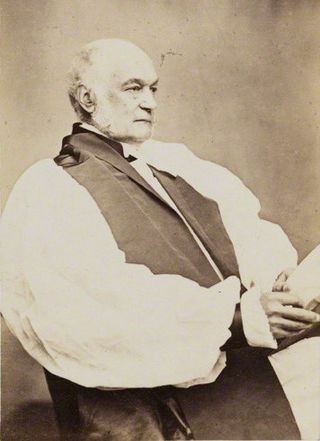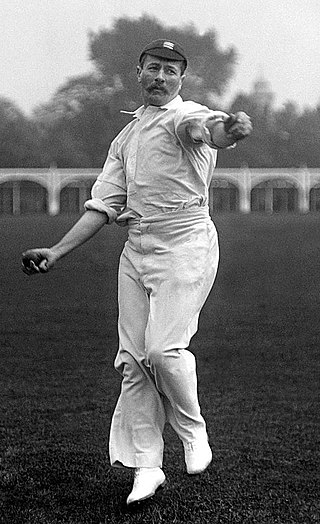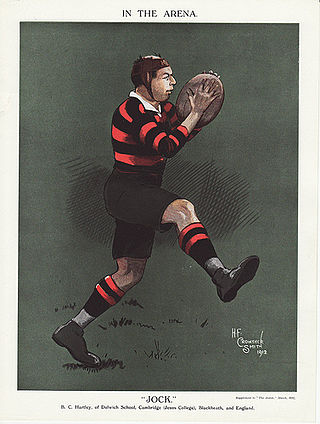
Dulwich College is a 2–18 private, day and boarding school for boys in Dulwich, London, England. As a public school, it began as the College of God's Gift, founded in 1619 by Elizabethan actor Edward Alleyn, with the original purpose of educating 12 poor scholars. It began to grow into a large school from 1857 and took its current form in 1870, when it moved into its current premises.

William Owen Chadwick was a British Anglican priest, academic, rugby international, writer and prominent historian of Christianity. As a leading academic, Chadwick became Dixie Professor of Ecclesiastical History in 1958, serving until 1968, and from 1968 to 1983 was Regius Professor of History. Chadwick was elected master of Selwyn College, Cambridge, and served from 1956 to 1983.

George Moberly was an English cleric who was headmaster of Winchester College, and then served as Bishop of Salisbury from 1869 until his death.

Gregor MacGregor was a former Scotland international cricketer and Scotland international rugby union player. He also played for the England international cricket team.

Cyril Mowbray Wells was an English cricketer, rugby footballer and schoolmaster.

Dulwich Prep & Senior (DPS), formerly known as Dulwich Prep London (2011-2024) and Dulwich College Preparatory School (1885-2011), is an independent preparatory school in Dulwich, south London, England for boys aged 3–13 years, with a co-educational Nursery. The current Headmaster is Louise Davidson.
Arthur Herman Gilkes MA, was a noted educationalist, author, and clergyman, and was Master of Dulwich College from 1885 to 1914.
Edward Peake was a Wales international rugby union three-quarter and county cricketer. Educated at Oriel College, Oxford, Peake would win a Blue for cricket before representing Gloucestershire. Peake is most notable for being a member of the first Wales rugby union team that played England in 1881. In his later life he became a teacher and Anglican minister.
Mason Thompson Scott was an English international rugby union half back who played club rugby for Cambridge University and Northern. Scott played international rugby for England and was an original member of invitational team, the Barbarians.
Richard Thomas Dutton Budworth was an English rugby union forward who played club rugby for Blackheath and international rugby for England. In 1890 Budworth became one of the original members of the Barbarians Football Club.
William Martin Scott was an English international rugby union half back who played club rugby for Cambridge University and Northern. Scott played international rugby for England and was an original member of invitational team, the Barbarians. He also played first-class cricket for Cambridge University.
Percival Coles was an English sportsman and sporting administrator. Although Coles did not play any sport at an international level, in rugby union he was one of the founding members of the Barbarians Football Club and later became Secretary of the Rugby Football Union. As a cricketer he played for Oxford University and Sussex.
Launcelot Jefferson Percival KVCO was an Anglican priest who in addition to various parish posts served in the Ecclesiastical Households of Queen Victoria, King Edward VII, King George V, King Edward VIII and King George VI.

Major Bernard Charles "Jock" Hartley OBE was a rugby union international player who represented England from 1901 to 1902. At club level he represented Cambridge University and Blackheath. In 1938 he was given the role of team manager of the British Isles team on their tour of South Africa.

Percy Christopherson was an English sportsman who played rugby union as a threequarter for Blackheath and represented England at international level. Christopherson also played cricket, making two first-class appearances. He was employed as a teacher at Wellington College, Berkshire.
William Martin Leake was an English civil engineer and industrialist and a cricketer who played first-class cricket for Cambridge University, the Marylebone Cricket Club and other amateur sides in the 1850s. He was born at Marylebone in London and died at Newnham on Severn, Gloucestershire.

Lilian Martin-Leake was a British astronomer, science teacher and scientific illustrator, and a member of British Astronomical Association (BAA). She joined an expedition organized by the Association to observe the total eclipse of May 28, 1900. Along with four other members she was stationed on the roof of the Hotel de la Régence in Algiers to examine the structure of the corona through a 3” (75mm) aperture telescope. Lilian joined the Association on 31 May 1893 at the proposal of Alice Everett and seconded by A S D Russell.
Clifford Wells was an English first-class cricketer, rugby union player, and educator.









